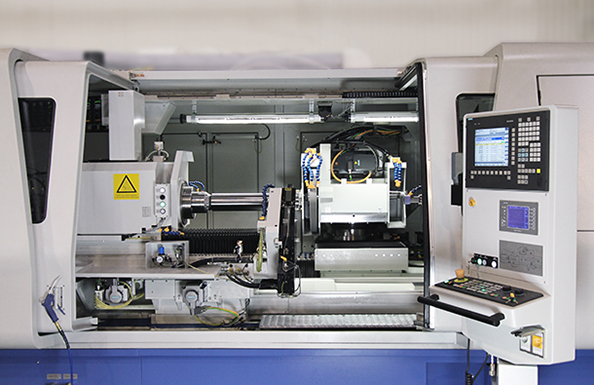
German Machine Tools of America is now the North American distributor of WEMA Glauchau GmbH.
WEMA’s internal grinding machines maximize operating times with more efficient and integrated procedures. A repeatedly allocable tool and workpiece headstock are guided on up to six axes with an accuracy of 0.1 μm. WEMA SI is scalable and is adapted to the clients’ needs through specific mounting for the greatest machining efficiency. Powerful drives ensure quick availability with additional work and peripheral modules reducing costly non-productive times. Available in four different series (S2I, S3I, S6I and S10I), it offers machining of chuck and shaft-shaped parts. In addition, the internal grinding machines are equipped with internal cylinder/ cone, internal polygons, internal screw threads, up to four applicable grinding tools and high rigidity through the use of cast beds/hydropol beds.
With WEMA SU, universal grinding machines are available for the complex task of three-way machining of all major workpiece sizes. The machines are equipped with external and internal grinding units. Clamping operations provide decisive efficiency and precision benefits. WEMA’s technology enables machines to perform highly complex operations, while peripheral modules permit greater flexibility. These machines’ features include up to three swivel axes, machining of four sides in one clamping operation, machining of chuck and shaft-shaped parts and external grinding wheels with a maximum diameter of 600 mm. WEMA SU also offers additional features such as four insertable internal grinding tools, four external grinding tools and cones, and polygons.
The company’s external grinding machines can machine parts up to 1,500 kg with external lengths of 600 mm in diameter and 2,700 mm. Grinding wheels are available in diameters of 500, 600, and 750 mm. Typical workpieces include railway axles, rollers, pipes and shafts.
Assemblies of the roller bearing grinding machines feature a strict modular structure used for various operations. One is for sequential internal, external and rim machining operations. Another is for simultaneous internal and external machining operations. Other modular structures are used for external machining operations, internal machining operations and rim machining operations. Machining jobs can be carried out on single or multi-row outer rings (OR) and inner rings (IR) of diverse bearing types. Notable features on these WEMA machines include three different types of milling centers (SW3, SW6, SW10), grounding of borings and tracks of inner rings, as well as tracks and outer diameters of outer rings. Outside rings have a diameter of approximately 300 mm to 900 mm. Shoulders, rims and more can also be ground, and different grinding operations can be performed in sequential or simultaneous grinding procedures.
Although the company’s grinding machines cover a wide range of possible applications, they also build and design grinding machines to order, ranging from more or less customized adaptations to complete designs of the machine.
Contact Details
Related Glossary Terms
- centers
centers
Cone-shaped pins that support a workpiece by one or two ends during machining. The centers fit into holes drilled in the workpiece ends. Centers that turn with the workpiece are called “live” centers; those that do not are called “dead” centers.
- chuck
chuck
Workholding device that affixes to a mill, lathe or drill-press spindle. It holds a tool or workpiece by one end, allowing it to be rotated. May also be fitted to the machine table to hold a workpiece. Two or more adjustable jaws actually hold the tool or part. May be actuated manually, pneumatically, hydraulically or electrically. See collet.
- gang cutting ( milling)
gang cutting ( milling)
Machining with several cutters mounted on a single arbor, generally for simultaneous cutting.
- grinding
grinding
Machining operation in which material is removed from the workpiece by a powered abrasive wheel, stone, belt, paste, sheet, compound, slurry, etc. Takes various forms: surface grinding (creates flat and/or squared surfaces); cylindrical grinding (for external cylindrical and tapered shapes, fillets, undercuts, etc.); centerless grinding; chamfering; thread and form grinding; tool and cutter grinding; offhand grinding; lapping and polishing (grinding with extremely fine grits to create ultrasmooth surfaces); honing; and disc grinding.
- milling
milling
Machining operation in which metal or other material is removed by applying power to a rotating cutter. In vertical milling, the cutting tool is mounted vertically on the spindle. In horizontal milling, the cutting tool is mounted horizontally, either directly on the spindle or on an arbor. Horizontal milling is further broken down into conventional milling, where the cutter rotates opposite the direction of feed, or “up” into the workpiece; and climb milling, where the cutter rotates in the direction of feed, or “down” into the workpiece. Milling operations include plane or surface milling, endmilling, facemilling, angle milling, form milling and profiling.
- reaction injection molding ( RIM)
reaction injection molding ( RIM)
Molding process that allows the rapid molding of liquid materials. The injection-molding process consists of heating and homogenizing plastic granules in a cylinder until they are sufficiently fluid to allow for pressure injection into a relatively cold mold, where they solidify and take the shape of the mold cavity. For thermoplastics, no chemical changes occur within the plastic, and, consequently, the process is repeatable. The major advantages of the injection-molding process are the speed of production; minimal requirements for postmolding operations; and simultaneous, multipart molding.
